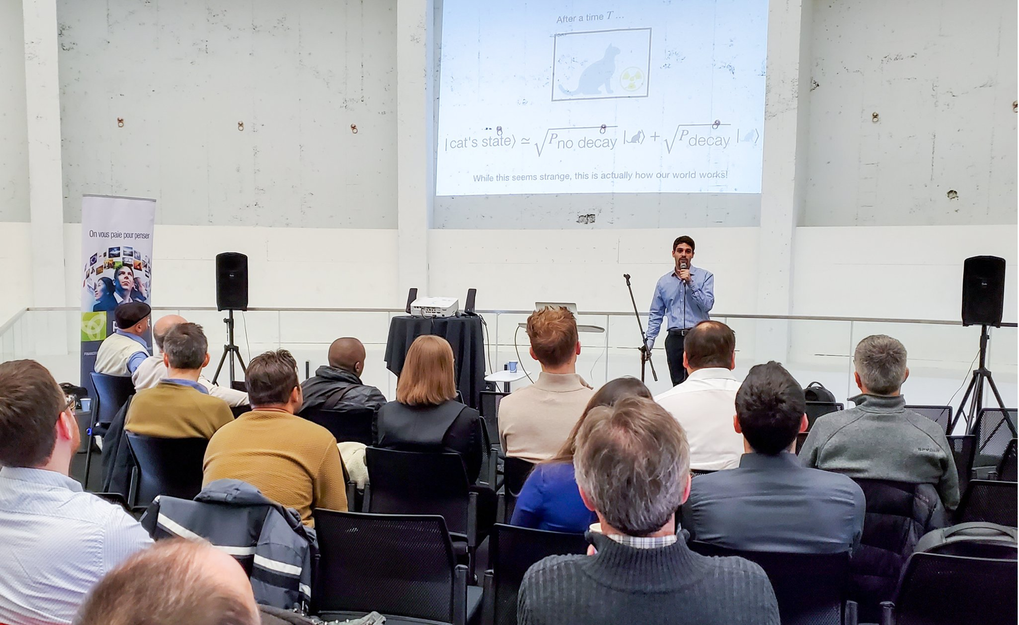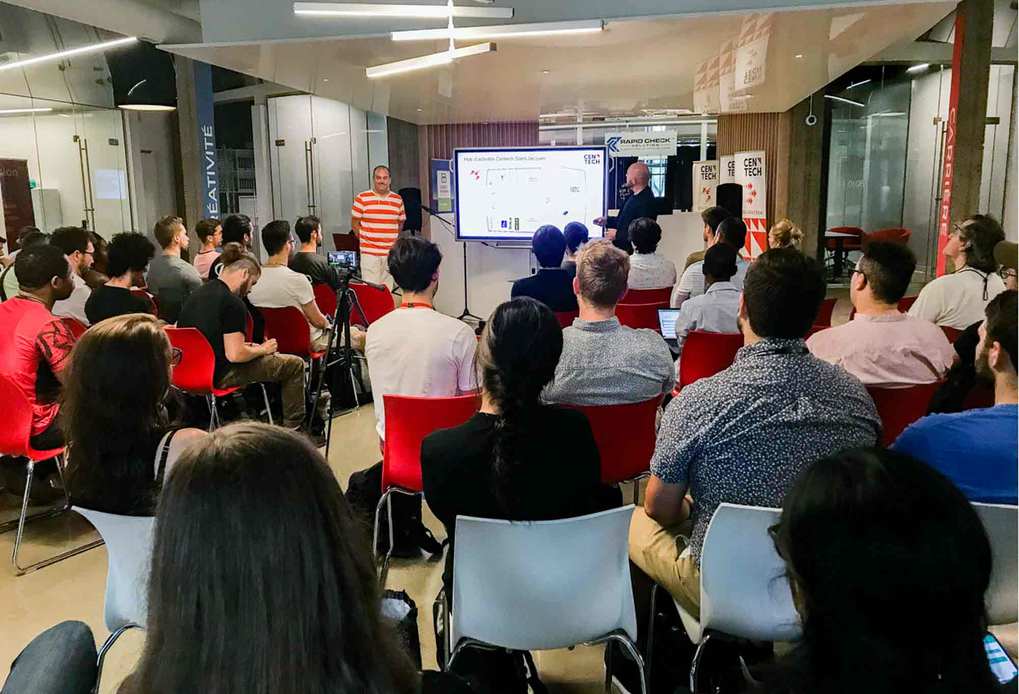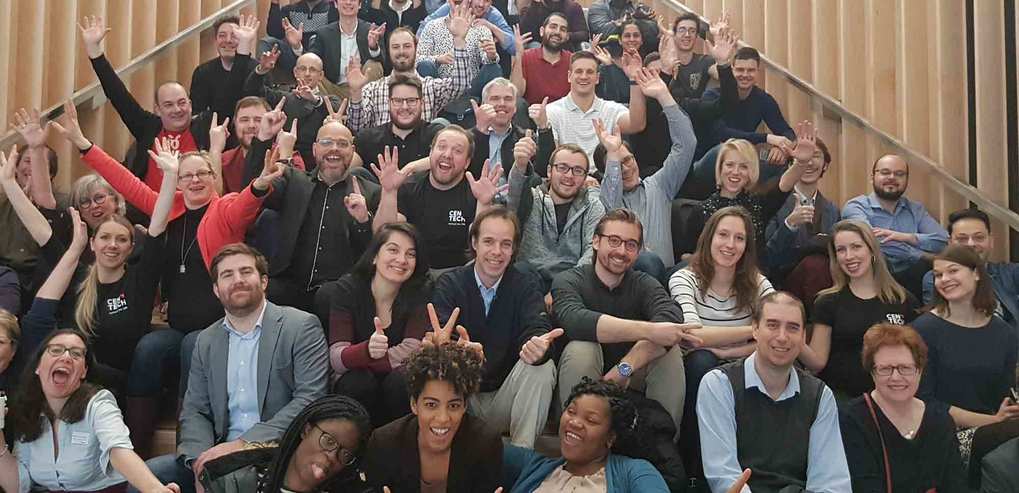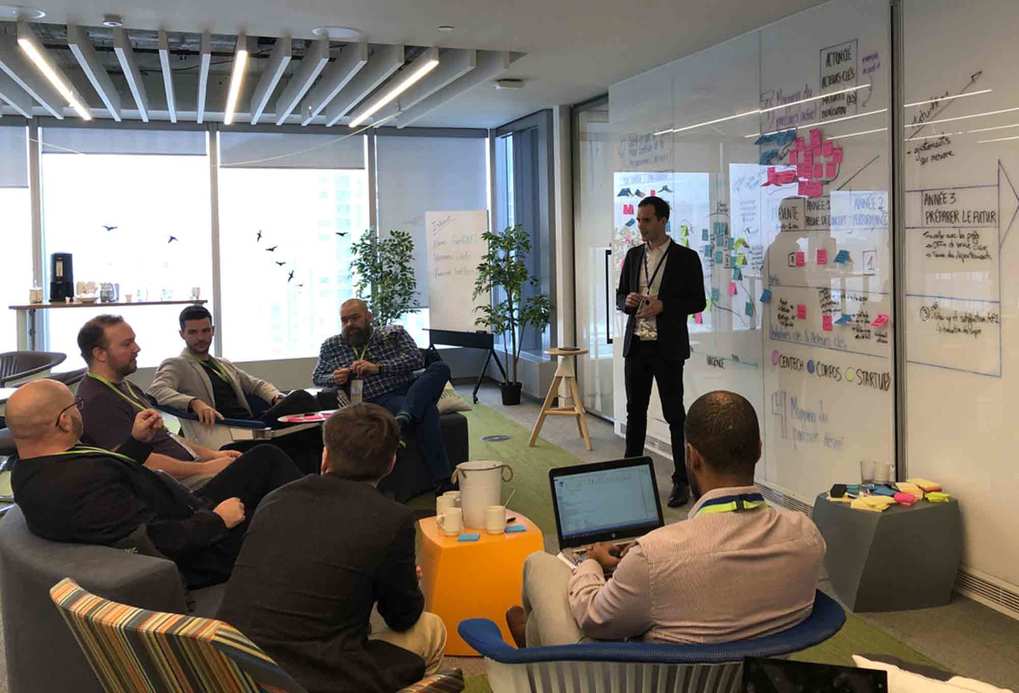It has produced one of the highest concentrations of high technology entrepreneurs in Canada. In addition, Centech now offers innovation units that can accommodate big corporations and companies seeking to develop new products and allows them to benefit from the agility of new businesses and the entrepreneurial ecosystem at Centech. As Centech's General Manager, Mr. Chénier plays a leading role in Montreal’s start-up ecosystem and in Canada’s more widely. BrandBourg has been one of Centech’s partners since 2017.
Branding plays an important role in innovation because things like a corporate tagline, a business card, or a referral are what help people make the link between what a company is and what it does with respect to innovation. The brand is the interface between the product and the customer: you can have an extraordinary product, but beware if the brand doesn’t measure up. For me, branding is like choosing a name for your child. It’s a bit like a baptism. The brand is a reference point which an innovative company can rely on to market itself. It invites people to notice the product, to be curious about what it is and what it does.
Yes, and this is especially true of start-ups, which have no track record. Coming onto the scene with a brand, a logo, and a URL lends a company credibility. Otherwise, it’s nothing more than a plan and product. By christening it, by giving it a personality and a distinctive look, you make its existence official. It’s like when you name a child, the name gives the child a personal identity: it’s no longer just “the baby.”
We do a 360 review of everything required to make a business successful. Branding is an important part of it all. Our entrepreneurs can avail themselves of our workshops on the subject and take advantage of our access to experts in the field.
Yes, sometimes, and not only through the intermediary of our guest specialists, but also directly, for instance when a name has been chosen that is difficult to express or pronounce. Since the companies we deal with are start-ups, it’s possible to revisit the branding. The worst case I’ve seen was that of an electrical engineering firm called “De Mtl.” Let’s just say the name didn’t reveal very much about the company and its product. What’s difficult about branding is not so much finding a name, but the personality you want to associate with that name. You can attach too much importance to the name itself and wind up devoting too much effort to it. There are also practical matters to consider: Is the domain name available? What results do you get when you google the name? If you type “De Mtl,” the company will be hard to find. So there are very basic practical questions that need to be addressed.

We challenge their thinking, but it’s not our role to tell them to change. We share our thoughts and opinions, and we have experts who come to lead workshops, but it’s up to the entrepreneur to decide whether to keep or change their name. We work with companies that export internationally, so they need to take that into consideration when developing their brand.
They’ve often created the brand on the back of a napkin. But as they evolve, they come to realize the importance of branding. For me, what’s at stake is nothing less than the personality of the company — defining its voice and its narrative. The name itself is not that important, as long as it’s functional and can be given a good personality and an appealing look and feel. As they grow and develop their product and their business (we catch them early), the process of finding out who they are as a company and who their market is helps them to better define themselves. We frequently see brands change in midstream. I think that about a quarter of the projects we support change their brand. Of the businesses which are doing well and have a healthy market, one in four changes their name along the way. They shorten it, simplify it, and generally make it more effective.
As far as I’m concerned, managing the brand means managing the entire set of communication tools. When you produce a business case for an investor, does your brand stand out? Is it reflected in all aspects of the project? If you produce promotional material for the company, is the content designed to communicate the brand? It’s all about the company’s personality – its brand.
Up to a point. We have various external partners who will push a little harder. We point them in the right direction, give them a framework and challenge their logic, but there are specialists for that. When it comes to branding, you can’t improvise. Sometimes the results are disappointing. I remember once when I was at ÉTS formation and we came up with a very simple brand. We found a lot of interesting names to replace “ÉTS formation.” And there was someone who remarked, “It cost us X to find that.” Yes, but all the thinking behind it was valuable and it was worth the investment.

It’s something we try to discourage straightaway. We urge them to target a specific market. It’s counterproductive for a start-up to tackle all markets at once. It’s better to focus on one market segment or one product segment. When the company has matured, it can develop a more complex organizational structure and at that point they can make different decisions. But the first piece of advice they get is focused on their MVP (minimum viable product): what are their easy targets and in which areas?
If you’re in Manufacturing 4.0 – and that can happen with technologies that target several business verticals – you have to see which vertical you want to tackle first. Because you’re going to have to channel your energies in that direction and you have to ask yourself if the brand is going to be a liability, or if you’re going to take your branding all the way and set up a parallel company one day to meet the needs of other industries. I remember “Innove to learn”, they can target all industries with that name, but the brand is very Med Tech logo and all. They have limited the appeal of the company name to one specific industry. I talk a lot about the issue of the name, but there’s also the image that goes with it, which is sometimes much more important than the name. At one time, they wanted to kill the name Centech. When I was appointed general manager of Centech in 2016, people in the industry would say “Don’t go to Centech, it isn’t a good incubator.” And I remember we had worked with BrandBourg, who convinced us to keep the Centech name. We wanted to change it. It had a bad reputation. But BrandBourg told us the name wasn’t well known enough for it to be an issue. They said, we’re going to make the brand talk, give it a new lease on life, and we’ll see what happens from there. The name Centech isn’t a bad name in itself. We changed the look and the tagline to make it more dynamic. And the brand is also represented by the people who run the organization. For me, branding goes far beyond a name and a logo – it’s the personality of the organization.

It’s a major risk because weak branding signals a lack of professionalism. It’s one thing for a start-up, but when you want people to invest in your company, you have to show that you’re all set to launch a business. That doesn’t mean having the full range of communication tools, a vast arsenal with ads and corporate videos. A solid brand foundation with a well-defined identity and a few communication tools that are in sync with the brand are enough to send investors the message that you’re a serious and credible company. But if it’s amateurish, if you’ve bought a $30 logo on the Web or you’ve placed an order with someone in India for a $20 logo design, and if it looks like you haven’t put much thought into your brand, to me that suggests that you’re neglecting an important dimension of your brand. One of the things we teach our entrepreneurs is that even though we’re in high tech, the product accounts for 10 percent of the company’s success. The rest is marketing and sales. And branding is crucial in steering the approach to marketing and sales. It also plays an important role in personalizing the product.
At our company, we defined this clearly. We offer two programs, Propulsion and Acceleration. When you’re enrolled in Propulsion, there’s an initial kit dealing with the essentials. There’s one section where we ask, “Do you have a company name? Do you have a logo?” That’s part of the essentials: the shareholder agreements, the GST/QST registration, the brand – is there a brand? Young entrepreneurs have three months to sort out the essentials so that they can move ahead and receive additional support from us.
We’re very strong in B2B. It’s what we focus on. In B2B, brands are sometimes a little less sexy. But for me, the brand is still the reference point. Giving your company a good name and a strong brand signature is an assurance of quality; it contributes to building a good reputation and it winds up opening a lot of doors.
That’s a good point. We also say that entrepreneurship is a contact sport.

" if it looks like you haven’t put much thought into your brand, to me that suggests that you're neglecting an important dimension of your brand. "
Honestly, it’s fantastic. I really don’t think it exists anywhere else in the world. We’re probably the only incubator with a multidisciplinary design school. I never would have guessed that this in-house design team would add so much value. With the first cohort, the profiles weren’t ideal, so we had to do a little more work, but given that we have people who do product design, brand design and interactive design, these are three areas that are extremely important for our companies. Often when our entrepreneurs need to put together little communication kits and do some thinking about their brand, there is a designer ready to work with them very early on. There are products that wouldn’t be where they are today had we not had industrial design teams. The engineers and scientists we work with don’t have a product-oriented mentality, they think in terms of what works! So our designers lead them to think much more about the user and what the product communicates. Some of them, especially in industrial design, even think about production. This is of central importance and it has an impact on cost.
A colleague of ours, Luc Giguère, was contacted by a design school in Nantes. It’s one of the best design schools in the world, with studios in Brazil, Benin, India and China. The Montreal studio is their fifth. They wanted to give it an entrepreneurial flair. They tried to partner with the universities, but that didn’t work out. It’s complicated to deal with them. Our attitude was: this is our ecosystem, this is what we create. At the time we weren’t located in our current premises in the planetarium. We planned on having start-ups and established companies with which we could show proof-of-concept. We thought that incorporating a design school in the mix could prove very interesting. Our vision was to have different worlds collide: start-ups, established companies, students, researchers, as well as our designers and our multidisciplinary team. That’s what we believe in. We believe in biodiversity, not a monolithic approach. It was a complex undertaking because it had never been done before, but the design firm finally set up here a year ago, and it changed many things for many of our companies, especially with respect to branding.
View more relevant articles